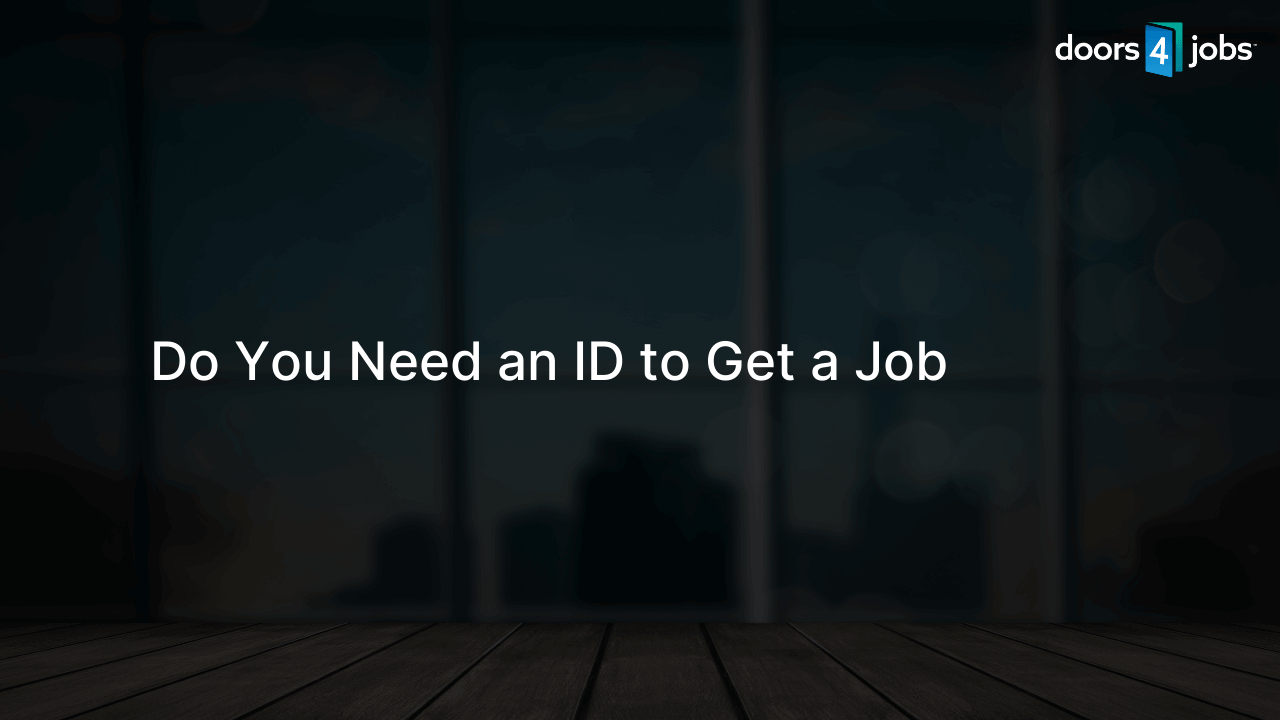Yes, an ID is generally required to get a job, as it helps employers verify your identity and eligibility to work. Common forms of acceptable identification include a driver’s license, passport, or social security card. Providing identification ensures compliance with employment laws and regulations.
Importance of Identification for Employment
In today’s world, having an ID is essential for securing any type of employment. This may include a driver’s license, passport, social security card, or other forms of identification. Employers verify your identity and eligibility to work for multiple reasons, such as ensuring compliance with employment laws and protecting their business from potential liabilities.
Types of ID for Job Applicants
Driver’s License or State ID Card
These are the most common forms of ID used for employment purposes. They display your full name, date of birth, and a recent photograph, allowing employers to verify that you are who you claim to be. Note that these IDs must be issued by a government agency and be unexpired.
Passports
A passport is another valuable source of identification for job seekers. Passports serve as proof of citizenship and also allow non-US citizens to establish their eligibility to work in the country.
Social Security Card
A social security card is typically required in combination with another form of ID to confirm your eligibility to work in the United States. This card is important as it provides your social security number, which is required for tax purposes by your employer.
How to Obtain an ID if You Do Not Have One
If you lack a government-issued ID, obtaining one should be a top priority when seeking employment. Contact your local Department of Motor Vehicles (DMV) to inquire about obtaining a driver’s license or state ID card. For a passport, visit the US Department of State’s website for instructions. Lastly, to obtain a social security card, contact the Social Security Administration (SSA) to learn the process and necessary documents.
Verifying Employment Eligibility
Once you have provided a potential employer with proper identification, they will typically complete an I-9 form, verifying your eligibility to work in the United States. The I-9 requires documentation establishing both your identity and employment eligibility, as outlined by US Citizenship and Immigration Services (USCIS).
Additional Forms of Identification
While the most common IDs used for employment include driver’s licenses, passports, and social security cards, there are other acceptable documents as well. For instance, a Permanent Resident Card (Green Card) can be used by non-US citizens to demonstrate both their identity and authorization to work in the country. In some cases, a birth certificate, naturalization certificate, or foreign government-issued ID may also be acceptable.
ID Requirements for Remote Jobs
Even if you’re applying for a remote job, you’ll still need to provide an ID to confirm your identity and employment eligibility. Companies hiring remote workers must adhere to the same employment regulations as those hiring for traditional in-person positions. As a result, you’ll need to be prepared to present valid identification to your prospective employer during the hiring process, regardless of whether you’ll be working on-site or remotely.
Protecting Your Personal Information
When providing identification for employment purposes, it’s essential to safeguard your personal information. Be cautious about where and how you store your sensitive documents like passports, driver’s licenses, and social security cards. Always use secure methods of communication when sharing your ID and consider removing any unnecessary sensitive information from your resume or CV. Additionally, ensure that you’re dealing with a reputable employer before submitting any personal information.
Understanding Employer Identification Policies
Each employer may have different policies regarding required documentation to establish your identity and employment eligibility. During the application process, read the job description and any company-specific guidelines carefully. When in doubt, don’t hesitate to contact the company’s HR department for clarification on their identification requirements.
FAQ Section: Identification Requirements for Job Seekers
Securing employment can be a complex process, involving numerous inquiries and documentation requirements. To better prepare job seekers, we’ve compiled a list of frequently asked questions and succinct answers centered on the topic of identification and its significance in the job market.
Can I use a student ID as proof of identity for a job?
Generally, a student ID may not be accepted as valid identification for employment purposes, since it doesn’t contain all the necessary information required by employers. Official government-issued documents, such as a driver’s license, passport, or social security card, are typically expected for employment verification.
Can I still get a job if I don’t have a Social Security card?
You can still get a job without a Social Security card, but you’ll need to provide other forms of identification, such as a driver’s license or passport, to verify your identity. It’s essential to apply for a replacement Social Security card, as employers typically require your Social Security Number for tax purposes and to complete forms like the I-9.
What if my ID is expired? Can I still use it to get a job?
Expired ID documents are generally not acceptable for employment purposes, as they do not conclusively demonstrate your identity and eligibility to work. It is recommended that you obtain a current government-issued ID, such as a valid driver’s license, passport, or state ID card, prior to applying for a job.
Will providing my ID guarantee that I get a job?
While providing an ID is an essential requirement during the hiring process, it doesn’t guarantee job placement. Employers use your ID for verification purposes and to comply with employment laws, but the final job offer depends on various other factors, including your qualifications, work experience, skills, and the interview process.
Do I have to provide my ID online during a remote job application?
Yes, remote job applicants must also provide identification to verify their identity and eligibility to work. Employers are obligated to adhere to the same employment regulations for remote positions as they do for traditional in-person roles. Always use secure methods to transmit your ID, and ensure you’re dealing with a reputable employer before sharing your personal information.











